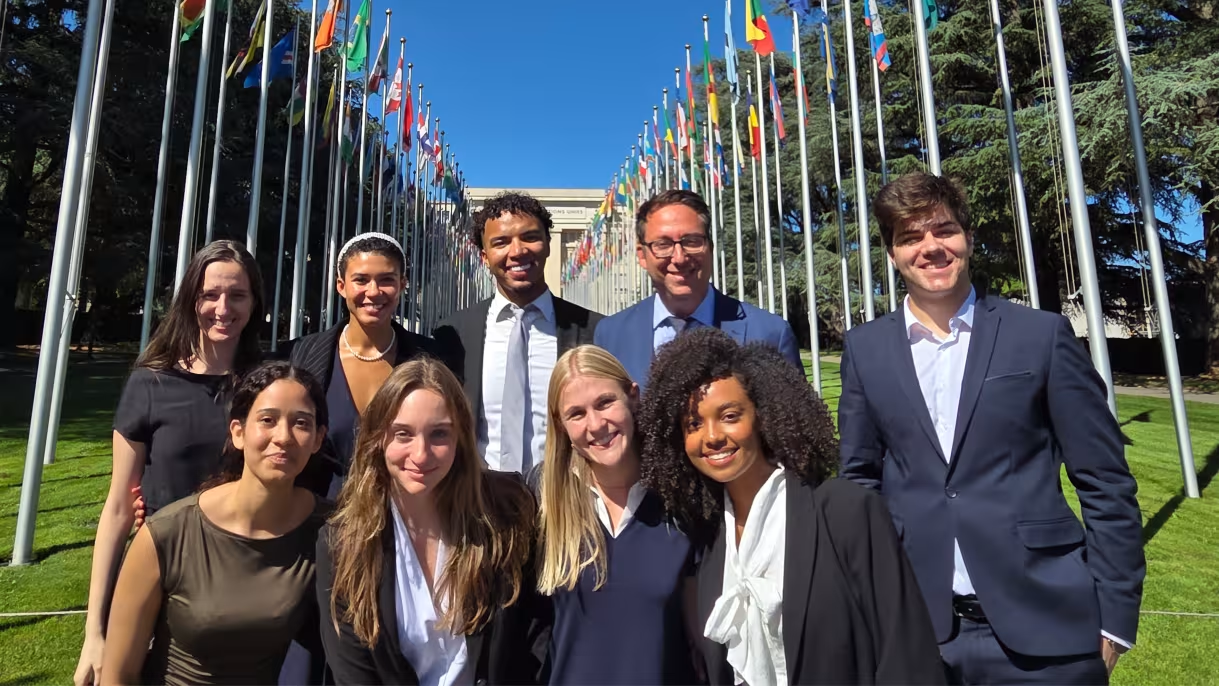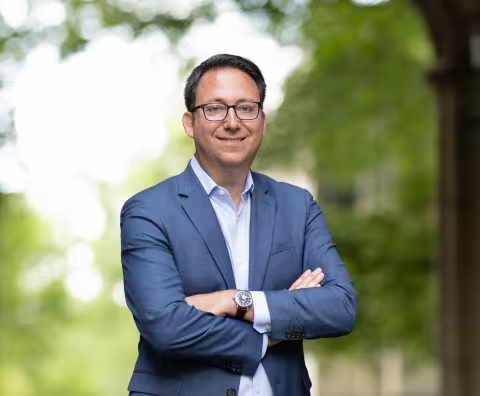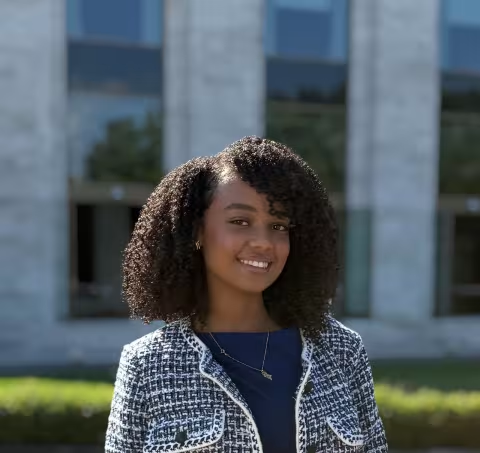

Undergraduate Students Conduct Death Penalty Research for U.N. in Landmark Geneva Course
A longstanding and distinctive feature of the Princeton School of Public and International Affairs’ undergraduate program is the Policy Task Force, an experiential junior-year requirement that lets students work directly on a timely public policy issue and propose their recommendations to government officials and policy advocates.
This summer, the School trialed an intensive, six-week Task Force in Geneva, Switzerland, the world’s hub for human rights. The eight undergraduate students who participated not only researched and wrote about the chosen policy topic — use of the death penalty in the United States — but they did so on behalf of the United Nations to contribute to a global report.
The working relationship with the U.N. was modeled after the Princeton Policy Advocacy Clinic, a yearlong course in which undergraduates work with lawmakers or advocates on a policy issue. The Clinic is part of Princeton SPIA’s immersive, experiential learning opportunities, and past students have also worked with the U.N.
The students had a tall order to complete their research in just six weeks. They met regularly with U.N. officials and Princeton SPIA alumni, soliciting input and guidance. Ultimately, they submitted a 195-page report to the U.N. Special Rapporteur on Extrajudicial, Summary, or Arbitrary Executions that was divided into eight chapters reviewing specific components of death penalty laws and practices in the U.S.

Led by Udi Ofer, former deputy national political director for the American Civil Liberties Union and the Clinic’s founding director, the class then presented the findings to the Special Rapporteur, who sent Ofer a letter praising the “great value” of the students’ “excellent… detailed, objective, and evidence-based” work, noting that it will greatly shape his official policy position as the office investigates the death penalty’s impact around the world.
“The letter validated the very idea that drove us to launch this experiment in the first place,” said Ofer, who is also the John L. Weinberg Visiting Professor and a lecturer at Princeton SPIA. “It shows that the Clinic has built something sustainable: a replicable model where undergraduate students can both learn advanced policy advocacy skills and produce work of direct use to policymakers at the highest levels.”
From Policy to Advocacy
The students began their journey in Geneva by absorbing stark facts: The U.S. has the fifth highest incarceration rate in the world, with more than 1.9 million people behind bars, earning it an incarceration rate that is five to 10 times higher than that of its wealthy, democratic counterparts. They studied the legal foundations of America’s criminal justice system, including the history of the death penalty, and the obligations imposed on the U.S. by U.N. treaties. They also learned about international human rights law, its precariousness, and ongoing challenges in creating effective mechanisms for accountability.
Outside the classroom, the students absorbed themselves in their research topics. Each person focused on a particular aspect of the death penalty — from execution methods and data to secrecy laws and academic studies on death penalty practices across states.
Because they were living and traveling together, they dove into the topic in a way that is rare when students are juggling multiple courses and priorities on the Princeton campus during the school year. They shared articles about their research with one another over croissants and coffees and engaged in debates while on side trips to France and Italy.
The students didn’t agree on whether to abolish the death penalty, but together they concluded that the ways it is practiced in the U.S. are arbitrary and discriminatory, particularly as applied to Black and mentally ill defendants, and that inmates have inadequate access to counsel and face inhumane confinement conditions.

“Even outside of the classroom, we were having these conversations,” said Fikir Beyene ’27, who grew up in Ethiopia and Mississippi, which she pointed out has the one of the highest incarceration rates in the U.S. “We were all beginning to understand that, despite attempts to reform all these various aspects of the death penalty, it was continuing to be practiced in such horrific ways that it wasn’t truly humane.”
Ofer said his proudest teaching moment yet at Princeton was witnessing the students go through the process of arriving at their own conclusions, given the diversity of opinion among them.
“By the end, it became clear to the students that the final report will be more powerful if it did at least provide some sort of concluding remarks, and that became that the death penalty is a violation of human rights as it is currently practiced in the U.S.,” Ofer said. “Every sentence and clause and period and comma was debated to make sure that it represented all the students’ viewpoints. These evidence-based conclusions were all driven and decided by the students, as the class took no position on the death penalty itself.”
An Immersive Experience
Being in Geneva also gave the students firsthand exposure to what it’s like to have a career in human rights and international law.
In addition to meeting with U.N. staff as they worked on their research, the students visited the World Economic Forum to meet with Princeton alumni who work there, including Aytuğ Göksu MPA ’10 and Astrid Wang ’22. They dined with other alumni, including Doug Griffiths MPP ’00 and Laurence Grummer-Strawn MPA ’89, PhD ’91.

On one notable evening, Kenneth Roth, former executive director of Human Rights Watch and the Charles and Marie Robertson Visiting Professor at Princeton SPIA, hosted the cohort.
“We had conversations about international conventions and discussed how human rights terminology is utilized in public discourse. There were moments like this throughout this experience. It’s unlike any other course I’ve taken at Princeton,” said Marko Ingjilizov ’27, who grew up in Macedonia and Tanzania and took the course to experience international policymaking.
There were also chance encounters that stood out, such as when the students chatted with U.N. workers on a city bus, or when they bumped into Ofer and his family, along with Paul Lipton, senior associate dean for academic administration, at celebrations for Swiss National Day on Aug. 1.
“They treated us to churros and we watched the fireworks together,” Ingjilizov recalled. “It was just incredible to be there.”
Lasting Impact
For Ofer, the most meaningful part of the course was seeing the impact that students who, only a few years prior, may have been in the Model U.N. could have on the world’s main human rights enforcer.
“When you combine rigorous academic training with real-world engagement,” he said, “students can become meaningful participants in shaping policy, not just observers of it.”
The students themselves were shaped by the experience in lasting ways, too.
Simone Acosta ’27, who was the first person in her Georgia county to gain admission to an Ivy League school in over two decades, knew before entering Princeton that she wanted to pursue a career in criminal justice. While in Geneva, she researched access to counsel for death-row inmates and discovered a dearth of data. Now, she plans to study it further, perhaps even mold it into a thesis.
“Personally, it’s changed my trajectory,” she said. “Throughout the course of the six weeks, I found myself becoming more and more interested in the topic and realizing this is something I might want to pursue throughout the rest of my time at Princeton.”

